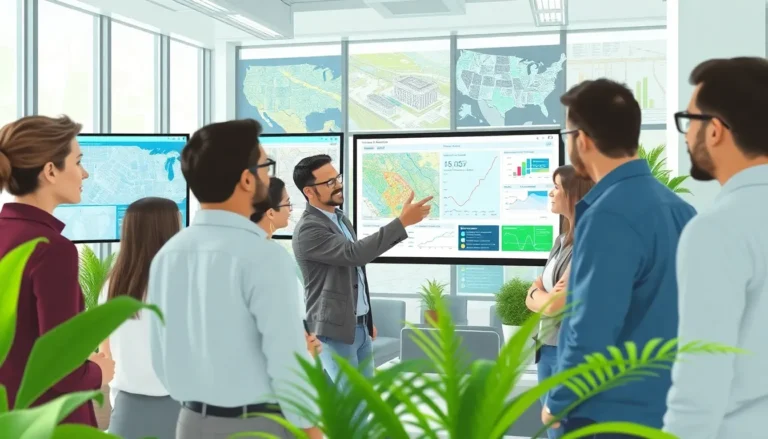Table of Contents
ToggleIn a world where technology reigns supreme, GovTech is the secret sauce transforming government operations from clunky to sleek. Imagine a bureaucratic maze where forms magically fill themselves out, and waiting in line is a thing of the past. It’s not just wishful thinking; it’s the reality that innovative startups and tech-savvy minds are crafting for our public services.
GovTech isn’t just about upgrading outdated systems; it’s about making life easier for citizens and officials alike. With everything from AI-driven chatbots to blockchain solutions, this sector is redefining how governments interact with their constituents. So, buckle up as we dive into the fascinating world of GovTech, where red tape meets cutting-edge innovation, and discover how it’s making democracy a little less… well, boring.
What Is GovTech?
GovTech refers to the integration of technology within government functions to improve service delivery and operational efficiency. It represents a shift toward modernized systems aimed at enhancing transparency and accessibility for citizens. Innovations in GovTech include platforms that facilitate real-time data sharing and communication between government agencies and users.
Technologies like artificial intelligence, machine learning, and blockchain play a crucial role in GovTech initiatives. AI-driven chatbots provide immediate responses to citizen inquiries, greatly reducing wait times. Blockchain solutions ensure secure and transparent record-keeping, enhancing trust in government processes.
The benefits of GovTech extend to increased civic engagement. User-friendly applications enable citizens to access services easily, participate in decision-making, and provide feedback on public projects. Technologies empower individuals, making government more responsive to the needs of its constituents.
Overall, GovTech not only updates existing systems but fundamentally transforms how government operates. Innovations aim to create streamlined processes that save time and resources, benefiting both officials and citizens. As technology advances, the potential for enhanced GovTech solutions continues to grow, making democratic engagement more efficient and impactful.
The Importance of GovTech

GovTech plays a vital role in modernizing government functions. Digital advancements simplify procedures, making public services more accessible and efficient.
Enhancing Public Services
Innovative technologies improve the delivery of public services. AI-driven chatbots respond to citizen inquiries instantly, increasing satisfaction and engagement. User-friendly platforms enable citizens to access information effortlessly. Applications that allow feedback and participation foster transparency and trust in governmental processes. Citizens feel empowered when able to engage directly with their governments through online services. This interaction leads to a more informed public, strengthening democratic participation. Overall, enhanced public services create a direct connection between officials and citizens, promoting a collaborative environment.
Improving Efficiency in Government Operations
Efficiency in government operations receives a significant boost from GovTech. Automation reduces repetitive tasks, freeing up employees to focus on critical issues. Blockchain technology provides secure and transparent record-keeping, minimizing errors associated with traditional methods. Data analytics offers insights that enhance decision-making, leading to more effective resource allocation. Through these technologies, government agencies streamline their processes and reduce operational costs. Citizens notice quicker responses to requests, indicative of a responsive government. Ultimately, improved efficiency allows for better public trust and confidence in government institutions.
Key Players in the GovTech Ecosystem
GovTech thrives through diverse contributions from startups, innovators, and established companies that reshape public sector functions. These players focus on enhancing service delivery and improving governmental efficiencies.
Startups and Innovators
Startups actively disrupt traditional government processes with fresh ideas and technologies. Many leverage tools like AI and cloud computing to create solutions that simplify citizen engagement. Innovators such as CivicPlus enhance community management, while companies like OpenGov provide platforms for budget transparency. These emerging firms prioritize user experience, ensuring that technologies meet the needs of both citizens and government officials.
Established Companies
Established companies also shape the GovTech landscape by providing reliable services and advanced technologies. Firms like IBM and Microsoft offer robust solutions for data management and cybersecurity, enabling governments to safeguard sensitive information. Additionally, Accenture and Deloitte deliver consulting services focused on digital transformation, helping public institutions adapt to evolving technological environments. Their long-standing expertise supports efforts to modernize government systems and streamline operations through proven methodologies.
Challenges Facing GovTech
GovTech faces several challenges that can impede progress and limit effectiveness. Understanding these obstacles is essential for navigating the evolving landscape of government technology.
Regulatory Hurdles
Regulatory frameworks often lag behind technological advancements. Governments may struggle to create regulations that adapt to rapid innovations in GovTech. Compliance requirements can become obstacles for startups introducing new solutions. In some cases, rigid policies may hinder the deployment of cutting-edge technologies such as AI and blockchain. Solutions may require lengthy approval processes, which delay implementation. Citizens ultimately experience slower service improvements due to these bureaucratic delays. Flexibility within regulatory systems promotes innovation and efficient service delivery.
Funding and Investment Issues
Securing adequate funding remains a significant hurdle for GovTech initiatives. Many startups lack access to venture capital or government grants necessary for growth. Budget constraints in public sectors can limit investment in technological advancements. Financial sustainability often challenges innovative solutions that require ongoing support. Established firms usually have the resources to invest in GovTech, creating an uneven playing field. Inequity in funding leads to missed opportunities for smaller players willing to drive innovation. Targeted investment strategies can bolster the GovTech ecosystem significantly.
Future Trends in GovTech
Emerging trends in GovTech showcase a shift towards more intelligent and efficient governance. Artificial intelligence continues to dominate, driving innovations in service delivery and citizen engagement. With machine learning, government systems can analyze vast amounts of data, helping leaders make informed decisions based on real-time insights.
Cloud computing plays a critical role, enabling governments to enhance data accessibility while ensuring secure storage. Increased use of open data platforms allows citizens to access public information, fostering transparency and accountability within governmental processes.
Blockchain technology remains essential for secure and efficient record-keeping. Its implementation guarantees data integrity and establishes trust between citizens and government entities. Additionally, automation technologies reduce administrative burdens by streamlining repetitive tasks, allowing public officials to allocate resources more effectively.
User-centric design in digital platforms empowers citizens to engage more easily with government services. By prioritizing user experience, governments enhance satisfaction and promote greater participation in democratic processes.
Evolving cybersecurity measures also highlight the increasing importance of protecting sensitive information. As cyber threats escalate, governments must invest in advanced security solutions, ensuring that data breaches do not compromise public trust.
Collaboration among public and private sectors shapes future developments in GovTech. Startups and established companies work together to create solutions that address specific challenges faced by governmental bodies. Together, they share expertise, fostering innovation and elevating service standards across the board.
Investment in education and training for government employees optimizes the adoption of new technologies. Emphasizing skill development ensures that public servants utilize digital tools efficiently, ultimately enhancing service delivery.
GovTech is redefining the landscape of public service by integrating advanced technologies into government operations. It enhances efficiency and fosters transparency while empowering citizens to engage more actively in democracy. The collaboration between startups and established firms is crucial for driving innovation and addressing the challenges that arise in this evolving field.
As GovTech continues to grow, it promises to create a more accessible and responsive government. The focus on user-centric design and robust cybersecurity measures will ensure that citizens can trust and rely on digital services. With ongoing investment in technology and training, the future of GovTech holds the potential for even greater improvements in public service delivery.







